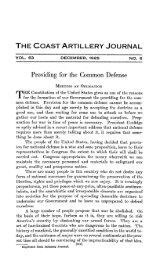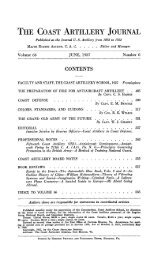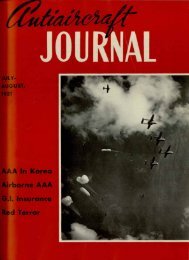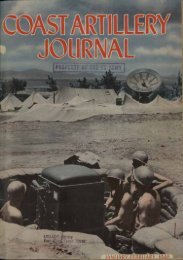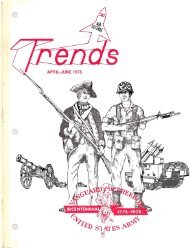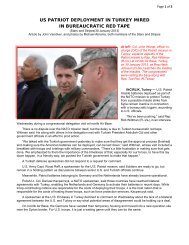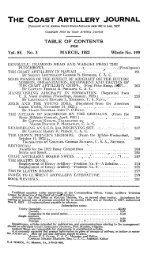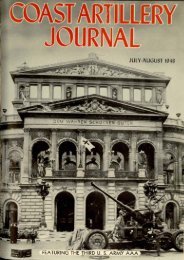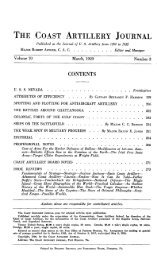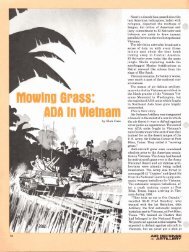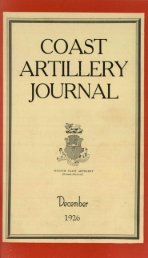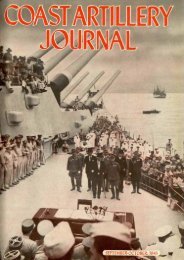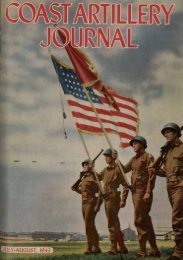COAST. I ARTILLERY JOURNAL, - Air Defense Artillery
COAST. I ARTILLERY JOURNAL, - Air Defense Artillery
COAST. I ARTILLERY JOURNAL, - Air Defense Artillery
Create successful ePaper yourself
Turn your PDF publications into a flip-book with our unique Google optimized e-Paper software.
416 THE <strong>COAST</strong> <strong>ARTILLERY</strong> <strong>JOURNAL</strong><br />
men can discuss learnedly subjects about which they have a very meager<br />
practical knowledge. However, while this method is unsatisfactory if<br />
used alone, in combination with the method discussed above it is<br />
excellent.<br />
Good oral questioning is extremely important in teaching. Questions<br />
center the attention on the point under discussion. They capture<br />
the attention when it has a tendency to wander. Ask the question fiJ;st,<br />
then wait a short time before calling upon an individual for an answer.<br />
This allows time for reflection and does not relieve the remainder of<br />
the class of the necessity to think also. Avoid calling upon the students<br />
in regular order but be sure that none are slighted. The student should<br />
not be interrupted in answering except to correct an error so grave that<br />
it needs the interruption to emphasize the correction. Occasionally<br />
have some other student point out errors in the answer given. Do not<br />
help the student in reciting. Questions which suggest the answers are<br />
useless. Insist on accurate answers, expressed in good English and<br />
complete without being rambling. Discourage sloppy work. Care<br />
should be taken not to allow questions to become irritating or to cause<br />
resentment. The instructor is not there to humiliate the class by showing<br />
them how little they know but to make them think and learn. Quesions<br />
should be clear. They should be couched in terms with which the<br />
student is familiar. They should not be asked in a rambling fashion, to<br />
use up the time, but should move toward a definite objective.<br />
Questions asked by the student are of three general types. First,<br />
there are the foolish questions, intended to divert the instructor, or<br />
such as are asked by the ingratiating or self-advertising student. If<br />
the instructor is sure a question is of this type he should show it up for<br />
what it is, but great care must be taken to avoid discouraging the really<br />
serious men from asking questions. l\ext there are questions which are<br />
either too easy or too hard to be of interest to the balance of the class,<br />
which may be called unnecessary questions. The answer to these should<br />
be deferred until after the lesson hour. Third, come the worthwhile<br />
questions. They indicate the points which have not been covered satisfactorily<br />
by the instructor. They should be answered at once for the<br />
benefit of the whole class and a record of them made in order that it<br />
may not be necessary for the next class to ask them at all.<br />
The fourth step is testing. The instructor, believing that he has<br />
fully presented the subject and that the students have grasped its essentials,<br />
should proceed to inspect the results of his work. Testing differs<br />
from oral questioning in that the instructor gives the student no<br />
assistance.<br />
\\here there is keen competition of honors, testing may be so directed<br />
as to determine the relative standing of the several members of the



